Dragon's Dogma 2 Is Better Without Fast Travel
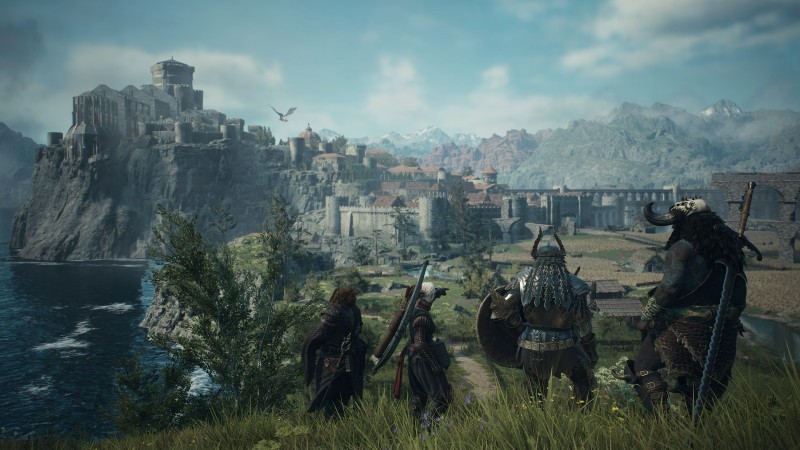
Fast travel is an extremely common and welcome quality of life improvement in modern open-world games, but it’s a mechanic Dragon’s Dogma 2 heavily deemphasizes. It sounds annoying, but to my surprise, it’s made me enjoy the game even more than I already did.
It’s worth noting there are some fast travel options in the game, but they’re limited. Oxcarts are the easiest, most affordable option, but they’re only available in certain cities, and each route only has one of two destinations. They’re also prone to attacks. In one extreme case, I got off the cart to slay some goblins, turned around to get back on the cart, and saw it get absolutely decimated by a griffin attack, leaving me stranded in the middle of nowhere. The other fast-travel option is an expensive item called a ferrystone, which can be used to travel to an extremely rare magic landmark called a portcrystal.
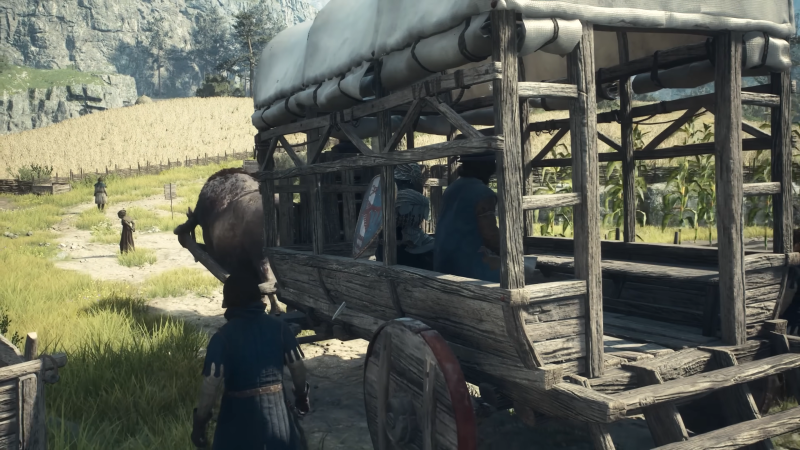
There was some controversy around the launch of Dragon’s Dogma 2 about the fact that certain items, including portcrystals, could be purchased as microtransactions. As I play the game, this frustrates me as well, but not because I wish it was a free option – it shouldn’t be an option at all. Using real money to sidestep that obstacle misses the point of the game, and it’s a frustrating way for Capcom to make money. Dragon’s Dogma 2 is designed around the inability to move quickly throughout the world and is far stronger because of it.
According to NPCs in the game, the world is perilous, but the lack of fast travel shows players just how dangerous and inconvenient it actually is. Journeying out into the wild means you’ll be facing enemies in battle, and the more damage you take, the more your maximum health drops. Too many encounters can leave you with a dangerously low health bar, leaving you just a few hits away from death, even from the easiest foes. You can only heal yourself fully by sleeping, which can be done in an inn in town or at campsites in the wilderness. You can only sleep at campsites if you have the right gear, though, and since it’s pretty heavy, you’ll have to clear space in your inventory. After all, the more you’re carrying, the slower you move.
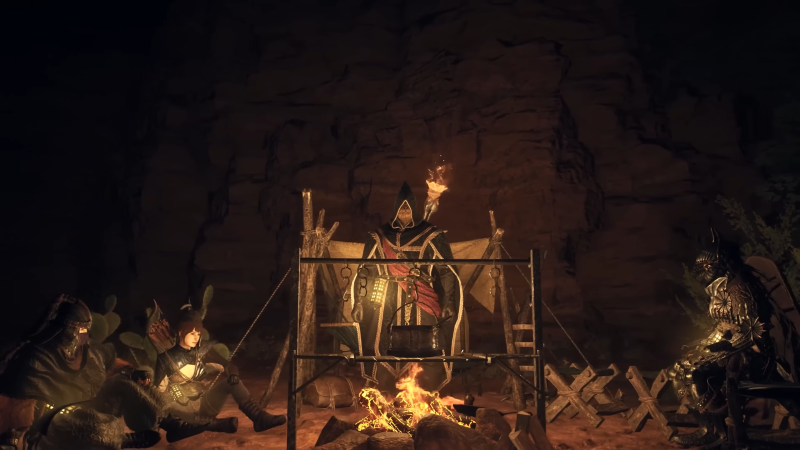
Even if you don’t need to heal, it’s worth making the space to avoid being exposed at night, when the monsters are much deadlier. That said, even in a tent, unlucky adventurers can be ambushed in the middle of the night, forcing you to flee or defend yourself. This is all assuming you can even find a campsite since visibility at night is very low, even with a lantern, and lanterns can run out of fuel if you’re not careful.
On paper, this sounds miserable.
It sounds like a game nobody in their right mind would play because it seems so intent on punishing the player. And yet, it’s these harsh systems that make the game so rewarding. Braving all of those conditions, defeating huge monsters, and barely arriving back to town alive is thrilling every time, and by the time you’re strong and smart enough to make expeditions with ease, you feel much stronger for it. My fondest memories of Dragon’s Dogma 2 all involve narrowly surviving dangerous journeys. Those memories wouldn’t exist if fast travel was an easy option.
It also adds to the scale of the world. Because other cities aren’t reached as easily, it’s a big deal to leave town to venture off to the capital of a neighboring country. When someone in one town asks you to visit another, it’s a huge request, because it might take multiple in-game days and a real-world hour. Imagine arriving in Berlin, Germany only to hear that someone needs a favor from you that involves a visit to Paris, France. It’s a monumental task and explains why they specifically need the help of an adventurer like you. When you decide to help someone, that decision has serious weight to it, especially when you take into account the fact that many of the quests run on a timer.
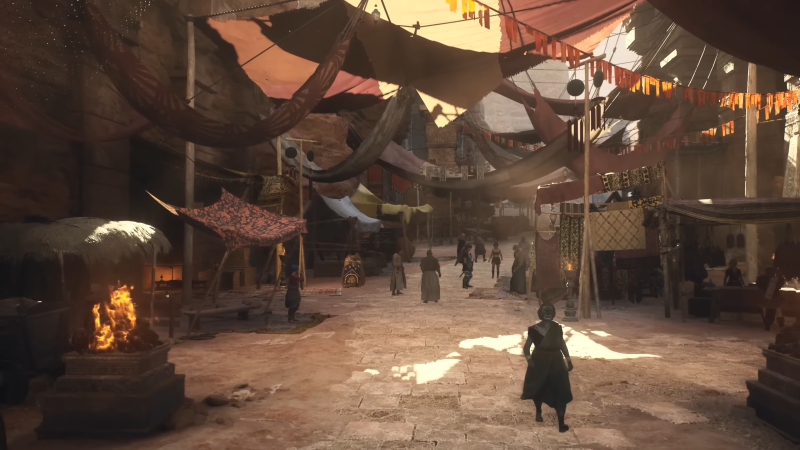
Here’s an example of an experience I had that would have been ruined by fast travel. It takes me the better part of an in-game day to reach a quest marker, where a group of bandits is supposedly headquartered. As I get close, one of them flees inside, and even though I’m not at full strength, I know I have to follow now or lose their trail. What follows is a grueling gauntlet that has me and my team of pawns taking on their entire organization, with several party members downed multiple times, until we finally claim victory.
But when I emerge back into the open air, there are two huge problems. First, it’s nighttime, and second, the closest campfire is currently the site of a battle between some travelers, an army of magic skeletons, and an ogre. I try to take the enemies out quickly so I can use the campfire to rest, but I quickly realize I’m way out of my league, especially after battling that whole bandit camp. My pawns all die, and I’m forced to limp off into the night, alone, hoping to find a campfire. I finally do, only to realize my pawn was carrying the camping gear – I couldn’t rest even if I wanted to. Then, as if things couldn’t get any worse, my lantern burns out, leaving me in the middle of nowhere with no friends and no light.
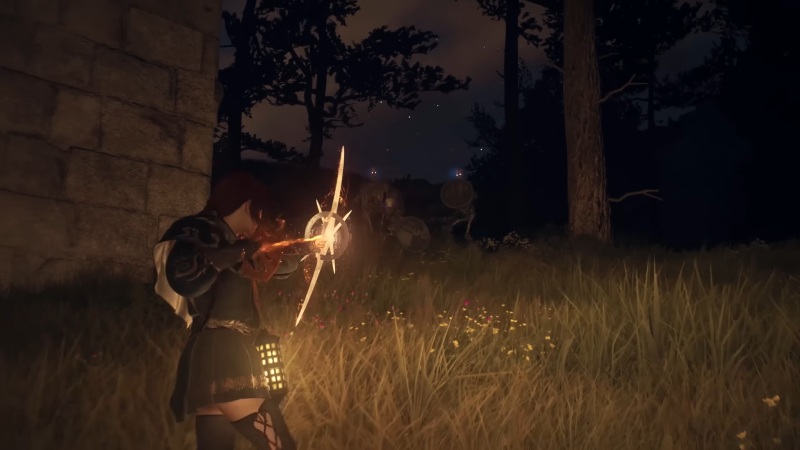
Despite all that, I survived. I managed to craft some more oil for the lantern, use a dash ability from my vocation to avoid enemies, and make it back to the nearest town just as the sun began to rise. This was not scripted, and if someone tried to write it into the game, it wouldn’t be as meaningful of an experience. The open world of Dragon’s Dogma 2 is not an obstacle you need to surmount to reach the main parts of the game. The open world is the game. It’s a symphony of hostile systems that, when overcome, create one-of-a-kind stories I get to tell my friends about. An easy, free fast travel system would negate all of this. The friction of the journey is what makes the conclusion so rewarding. Why would I ever want to avoid that?




